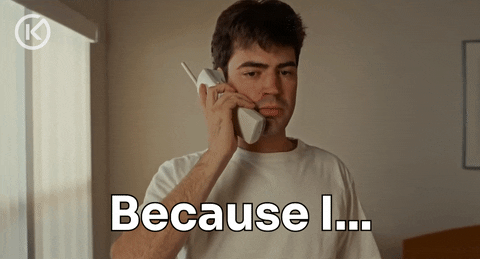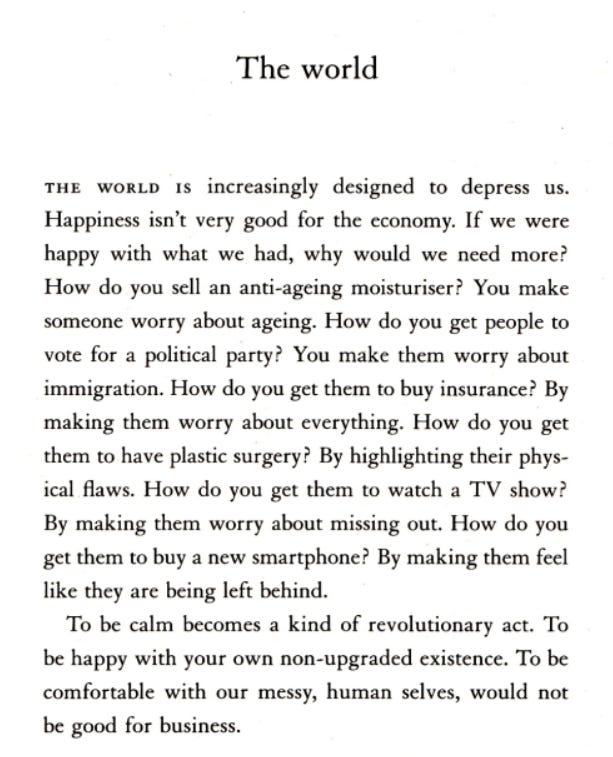What do we do when ambitions fade?
It’s February 22, 2023, and here’s the rundown:
What do we do when people simply don’t care as much about their careers?
“A revolutionary act”
Numbers and links
What do we do when people simply don’t care as much about their careers?
People are less ambitious. Does it matter?
Maybe there’s a little more to this “quiet quitting” thing than I realized.
This story from the Wall Street Journal caught my attention — I bookmarked it, and finally got around to reading it. It’s not necessarily full of brain-splitting revelations, but it does talk about the fact that yes, people are less ambitious. I, personally, have felt it. I don’t know about you all. But something has definitely changed, and I’m much more interested in throwing rocks in a river with my dog or boy than I am in trying to “expand my brand” or become a millionaire.
But reading this story, I think it’s more accurate to say that many Americans just have an unhealthy relationship with their jobs, and their willingness to go above and beyond — at all times and at all costs — has really distorted how employers think employees should behave. Essentially, you have had a lot of people who would do the work of one-and-a-half or two people, and hope that their manager would notice and one day, reward them for it.
That strategy may pay off for some people, it may not for others. But there are opportunity costs here. What’s the point of working 80+ hours per week when you don’t have any time to actually…live?
From the story:
In a November survey of more than 3,000 workers and managers by software firm Qualtrics, 36% said their overall career ambitions had waned over the past three years, compared with 22% who said their ambition had increased. Nearly 40% said work had become less important to them in the past three years, while 25% said it had grown more important, according to researchers at Qualtrics, which provides software to businesses to evaluate customer and employee experiences.
Even in hard-charging fields like law and finance, where all-nighters aren’t uncommon, some professionals are objecting to the grind. A group of first-year analysts at Goldman Sachs Group Inc. complained to bank leaders last year that they were working an average of 95 hours a week and that job stress had harmed their physical and mental health. Goldman, in response, said it would hire additional bankers and more strictly enforce boundaries around working hours. In an American Bar Association survey of nearly 2,000 members this year, 44% of young lawyers said they would leave their jobs for a greater ability to work remotely elsewhere.
There’s a lot at play here, and a lot to consider. Some people do love their work. Some work is important. And if we can find a way to put the people who love their work into the right jobs? Well, we’d be cooking with fire, wouldn’t we?
But as the story notes, we have comments like “nobody works, nobody gives a damn,” from the co-founder of The Home Depot — which gives us a bit of insight into how people are thinking instead. Why would anyone give a damn about working at The Home Depot? That, I believe, is the real question.
Then there’s this:
In an August survey of 1,234 HR employees, 45% said their organization has struggled more than usual to motivate employees to work beyond the required scope of their job in the past six months, according to the Society for Human Resource Management, which conducted the poll.
Again, why is the expectation that employees would work beyond the scope of their job? That’s not what these employees agreed to…so, why is it expected?
We’re witnessing, in real-time, a generational shift. In how we work, and in our priorities. It’s been a long time coming, too. This isn’t a shout-out to all the Peter Gibbons of the world, either, or the people who disappear into the bathroom for an hour or somehow have food poisoning twice per month or who are always late because they’re the victim in a multi-year, on-going series of traffic mishaps in which they’re never at fault.
It’s just that…things have changed. It’s not worth it, for many people, to work yourself into a nub. There’s more to life. There are times to give it your all, and letting off the gas a little bit isn’t some sort of economic crisis, as it’s being made out to be. We’re just monkeys circling a star on a space rock.
Anyway — read the story. It’s interesting. And I’d end with this: We make it pretty easy in this country for people to not give a damn about their jobs. Maybe if we focused on fixing some of the underlying problems with that, we’d see a little more get-up-and-go from the swarths of underachievers out there.
“A revolutionary act”
An excerpt that cuts deep.
I was clicking around the other day — you know, moseying about the internet — and came across this excerpt. I liked it, and thought it was worth sharing.
It’s from a book called “Reasons to Stay Alive,” a novel by Matt Haig. I’ve never read it, or heard of it until this week.
It’s not overly complicated or deep, either, but really hits at a solid point. I think it’s particularly well summed up by the sentence “to be calm becomes a kind of revolutionary act.
I think about this a lot. The next time you’re in a doctor’s office, on a bus or train, or anywhere public in which people have to wait for something, watch what others are doing. Without fail, 95% of them will be staring at their phones. The others? Probably fidgeting or pacing. Nothing wrong with that, of course, but it’s clear that we can’t simply sit quietly. We need a distraction.
Anything.
It’s fairly remarkable. We have really become entertained to death — we can’t sit still and shut the hell up. Even if we do, we probably need to make an Instagram post about the plight, and how “cringe” or “lit” it was.
(right, fellow kids?)
The first part of the excerpt is interesting, too. Everything depends on us not being happy or content, and there’s an awful lot of resources spent helping us realize just how unhappy we are, or making us aware of how much discontent is in our lives. Even if there is none.
It’s like when a church-goer tells you that your life is incomplete without god, and yet, here you are, living a complete life, without a hole in your heart.
(shoutout to the friendly Jehovah’s Witness who stopped by the other day to share his favorite Bible verse with me — unfortunately, I didn’t find it persuasive)
We could all do well to try and keep this in mind. Someone’s trying to sell us something — what problem are they trying to solve? Is there even a problem? Or do we even like the possible solution?
It’s coming at us from all angles, too. Smartphones, political parties, Pizza Hut — all have a solution to sell us.
Just remember: Keep still, keep calm. You’re probably fine. And if you can remain still and calm, you’re throwing a wrench in the works. But it may help you slow things down and catch your breath.
Numbers and links
$11.99: How much Facebook plans to charge for a new verification program — money well spent! (Reuters)
49.26 seconds: The new world record for the women’s indoor 400 meter dash, set Sunday by Femke Bol. (NBC Sports)
Cool: Check out National Geographic’s “Pictures of the Year” contest winners. (National Geographic)
First look: Unreleased video from the first dives when the Titanic was rediscovered in 1986. (Woods Hole Oceanographic Institution)
All about aim: Western countries are refocusing their training regimen for Ukraine troops — they need to stop using so much ammo. It’s just like playing “Resident Evil!” (Politico)
Fly free, friendo: Flaco, a Eurasian eagle-owl that escaped from the Central Park Zoo, will be allowed to go free and kill all the rats it wants. (The Guardian)



I don't think people have lost ambition, they've simply redefined it. They've come to the now painfully obvious realization that putting in long, perhaps inhuman hours at the job won't necessarily result in more money, promotion or even job security. Those long hours and taking on more than they are paid to do will make the company richer, but not them.
Naturally, as you mentioned, some people do love their jobs -- more than families, friends or personal life and being at the office is the only thing that gives meaning to their lives. For them, working fewer hours probably isn't an option. But, for most people reality has set in and they're taking advantage of the long overdue tight labor market to finally assert themselves.
And naturally, companies, managers and executives are having a melt down. The Wall Street Journal has been the prime chronicler and voice of the aggrieved executive in one story after another.
Workers having perceived the truth are, I think, not likely to go back to the idea that work is everything and that much of it should be free labor. Remember those stories of Japanese office men who worked long hours at the job and would sometimes be found dead at their desks? Now even Japan is trying to force people to work fewer hours.
Nice read! Something I have talked to my wife about a lot. Most people have a hard time describing what they are actually working towards. For many like that excerpt mentioned is the next smartphone, vacation, etc.